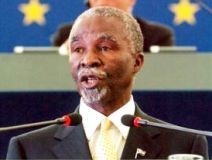Mbeki to visit Sudan for rebuilding talks ahead of key peace pact
JOHANNESBURG, Dec 28 (AFP) — South African President Thabo Mbeki will Thursday travel to Sudan to discuss post-war rebuilding ahead of a peace pact expected to be signed by Khartoum and the main rebel group to end two decades of conflict.
 Mbeki’s high-powered entourage will include Foreign Minister Nkosazana Dlamini Zuma, Defence Minister Mosiuoa Lekota and other cabinet members, a foreign ministry statement said Tuesday.
Mbeki’s high-powered entourage will include Foreign Minister Nkosazana Dlamini Zuma, Defence Minister Mosiuoa Lekota and other cabinet members, a foreign ministry statement said Tuesday.
South Africa currently chairs an African Union (AU) committee on rebuilding war-affected areas in Sudan, and Mbeki and his Sudanese counterpart Omar el-Bashir would review work by the body, the communique said.
It said the three-day visit would also give them an “excellent opportunity” to discuss the ongoing parallel peace talks between the Sudanese government and the rebels in Naivasha in Kenya and the Nigerian capital Abuja.
The AU, which has been trying to broker peace in Sudan, on Monday claimed that Khartoum and the main southern rebel movement, the Sudan People’s Liberation Movement/Army (SPLM/A), would sign a comprehensive peace agreement on January 10.
However, mediators and rebel could not confirm the statement, which said the pact due to be signed in Naivasha would “end the two decades of conflict in Southern Sudan.”
The South African communique was also upbeat about the expected signing of the agreement, saying it would “herald a new dawn in Sudans political and economic development.”
“In this regard, South Africa has already committed itself to provide, together with the University of South Africa, training for the SPLM leadership and other cadres to equip them … to participate equitably in the Transitional National Government of the Sudan.”
Mbeki was also due to discuss bilateral economic ties with el-Bashir and address a special session of the Sudanese parliament.
South African exports to Sudan in 2003 totalled 296 million rand (52 million dollars/ 38 million euros) while imports were worth 2.5 million rand (453,716 dollars/ 333,266 euros).
The southern Sudan war erupted in 1983 as a freedom struggle by the mainly Christian and animist south against successive Islamic, ethnic Arab governments in Khartoum.
Since then, the conflict has killed at least 1.5 million people and displaced four million.
